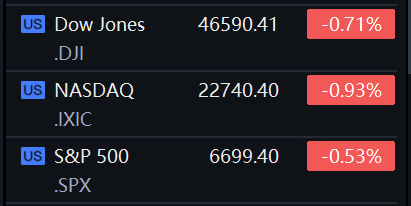Wall Street Ends Lower; Netflix Plunges 10%; Texas Instruments Sinks 6%; Intuitive Surgical Jumps 14%

Wall Street closed lower on Wednesday as a wave of mixed earnings, including Netflix's disappointing results, dampened risk sentiment as investors assessed reports that the Trump administration is considering curbs on exports to China made with U.S. software.
Market Snapshot
The Dow Jones Industrial Average fell 334.33 points, or 0.71%, to 46,590.41, the S&P 500 lost 35.95 points, or 0.53%, to 6,699.40 and the Nasdaq Composite lost 213.27 points, or 0.93%, to 22,740.40.

Market Movers
Netflix - Netflix declined 10.1% after the streaming giant reported third-quarter earnings that missed Wall Street estimates. Netflix posted adjusted earnings of $5.87 a share, below expectations of $6.96, blaming an unexpected tax dispute in Brazil. Revenue of $11.5 billion matched expectations. Netflix said it had its best-ever quarter for ad sales and was on track to more than double revenue from that business in 2025.
Texas Instruments - Texas Instruments fell 5.6% after the semiconductor company issued a disappointing earnings forecast for the fourth quarter. Texas Instruments said it expects profit in the period of between $1.13 and $1.39 a share, which at the midpoint was below Wall Street consensus of $1.41. For the third quarter, its adjusted earnings of $1.48 a share missed consensus by 1 cent. Revenue of $4.74 billion topped expectations of $4.65 billion.
Tesla - Tesla dropped 0.8% heading into its third-quarter earnings report, which was scheduled for after the closing bell Wednesday.
AT&T - Wireless carrier AT&T said more customers than Wall Street expected had switched to its cellphone plans over the third quarter, whileearnings and revenuefor the quarter were in line with analysts’ estimates. The stock fell 1.9%.
Vertiv Holdings - Vertiv Holdings, the technology infrastructure company, posted third-quarter adjusted earnings that beat analysts’ forecasts and raised its full-year earnings expectations. Shares, however, declined 1.8%.
Amphenol - Amphenol gained 3.6% as the electric connector manufacturer posted better-than-expected third-quarter earnings and sales, which rose 53% from a year earlier to $6.2 billion. Amphenol cited strong organic growth in virtually all its end markets, “including exceptional organic growth in the IT datacom market, as well as contributions from the company’s acquisition program.”
GE Vernova - GE Vernova, the power-generation equipment company, reported third-quarter earnings before interest, taxes, depreciation, and amortizationof $811 million on sales of $10 billion, beating Wall Street forecasts on both metrics. Orders in the quarter rose 55% from a year earlier to $14.6 billion. The stock, however, declined 1.6%, reducing its gain this year to 75%.
Winnebago - Winnebago Industries surged 28.5% after the motor home manufacturer swung to a fourth-quarter profit as sales rose 7.8% to $777.3 million. The company said the gains were “primarily due to favorable product mix and targeted price increases, partially offset by higher discounts and allowances.”
Intuitive Surgical - Intuitive Surgical jumped 13.9% after the maker of robotic surgery systems posted third-quarter earnings that topped analysts’ estimates. The company also said it expects growth of its da Vinci robotic surgical system of between 17% and 17.5% this year, higher than its prior forecast for growth between 15.5% and 17%.
Mattel - Mattel declined 2.8% after the toymaker’s third-quarter earnings and revenue fell short of expectations. North America sales declined 12% from last year, weighing on total sales, which fell 6%. CEO Ynon Kreiz said Mattel’s U.S. business “was challenged in the third quarter by industry-wide shifts in retailer ordering patterns.”
Newmont Mining - Newmont rose 0.8% after tumbling 9% on Tuesday, the miner’s largest daily percentage decrease in about a year, as gold prices sank. Front-month Comex gold for October delivery lost $43.30 per troy ounce on Wednesday, falling 1.1% to $4044.40. Gold futures were trading down 0.6% at $4,086 an ounce.
DraftKings - DraftKings rose 3.2% after the sports-betting site acquired prediction markets company Railbird Technologies and said it plans a mobile app that will allow users to trade contracts on the outcomes of events in finance, culture, and entertainment.
Market News
Tesla Profit Falls Short Despite Record Sales, Hit by Higher Costs and Fading Credits
Tesla reported record third-quarter revenue that beat Wall Street estimates on Wednesday, driven by the highest quarterly sales of its electric vehicles as U.S. buyers rushed to lock in a key tax credit ahead of its expiry last month.
However, Tesla's profit failed to live up to analysts' expectations, in part due to tariff and research costs, as well as a drop in income from regulatory credits that are expected to continue to fade away with recent legislation passed by the Trump administration.
Tesla's $1.45 trillion valuation largely reflects investor bets on CEO Elon Musk's pivot to robotics and AI, but vehicle sales remain key to the financial stability of the company while those products are being developed.
US Mulls Curbs on Exports to China Made with US Software, Sources Say
The Trump administration is considering a plan to curb a dizzying array of software-powered exports to China, from laptops to jet engines, to retaliate against Beijing's latest round of rare earth export restrictions, according to a U.S. official and three people briefed by U.S. authorities, Reuters reported.
While the plan is not the only one being deliberated, it would make good on President Donald Trump's threat earlier this month to bar "critical software" exports to China by restricting global shipments of items that contain U.S. software or were produced using U.S. software.
On October 10, Trump said in a social media post that he would impose additional tariffs of 100% on China's U.S.-bound shipments, along with new export controls on "any and all critical software" by November 1 without further details.
US Hits Top Russian Oil Companies Rosneft and Lukoil with Sanctions
U.S. President Donald Trump on Wednesday imposed Ukraine-related sanctions on Russia for the first time in his second term, targeting oil companies Lukoil and Rosneft as his frustration grows with Russian President Vladimir Putin over the war.
The U.S. Treasury Department said it was prepared to take further action as it called on Moscow to agree immediately to a ceasefire in Russia's war in Ukraine, which began in February 2022.
The sanctions are a major policy shift for Trump, who had not put sanctions on Russia over the war and instead relied on trade measures. Trump imposed additional 25% tariffs on goods from India in retaliation for it purchasing discounted Russian oil.







